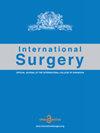改良直肠内推进皮瓣治疗复杂性肛瘘的手术技术和效果
IF 0.2
4区 医学
Q4 SURGERY
引用次数: 0
摘要
背景:肛门瘘是外科医生常见的问题,可分为简单型和复杂型。复杂瘘管(CF)会导致更高的发病率,治疗难度更大。尽管CF有多种治疗选择,但没有一种被证明是100%有效的。直肠内推进皮瓣(EAF)手术是作为CF传统手术治疗的替代方案而开发的。在此,我们描述了EAF手术的一种新的改进,以及复发、大便失禁和皮瓣衰竭相关因素的手术结果。方法:对2004-2019年间接受EAF的CF患者进行回顾性分析。传统的EAF手术通过在内瘘口上进行内括约肌的横向叠瓦术进行了改进。术后复发和大便失禁的发生率根据最后一次随访日期的图表文件进行计算。此外,各种临床和人口统计学因素与术后皮瓣失败之间的相关性在α为0.05时具有统计学意义。结果:中位随访时间为6.6个月(范围:3.3-24个月),99名CF患者接受了改良EAF。其中,93%(92/99)手术成功,7%(7/99)复发,1%(1/99)新发性大便失禁。全身类固醇或免疫调节治疗的使用(p=0.001)和诊断为炎症性肠病的患者(p<0.0001)与复发率增加有关。结论:应用间断可吸收缝线内口横向叠瓦式EAF是治疗复杂性或复发性肛瘘的有效方法。它与复发风险低(7%)和大便失禁风险低(1%)有关,是CF的有效治疗选择。本文章由计算机程序翻译,如有差异,请以英文原文为准。
A novel modification of the Endorectal Advancement Flap for complex anal fistulas: surgical technique and outcomes
Background:Fistula-in-ano is a common problem encountered by surgeons which can be classified as either simple or complex. Complex fistulas (CF) cause higher morbidity and are much more challenging to treat. Although numerous treatment options are available for CF, none are proven to be 100% effective. The endorectal advancement flap (EAF) procedure was developed as an alternative to conventional surgical treatments for CF. Herein, we describe a novel modification of the EAF procedure along with surgical outcomes in terms of recurrence, fecal incontinence and factors associated with flap failure. Methods:A retrospective review of patients with CF who underwent EAF between 2004-2019 was done. The conventional EAF procedure was modified by performing transverse imbrication of the internal sphincter over the internal fistula opening. The incidence of post-operative recurrence and fecal incontinence were calculated from chart documentation at the last available date of follow-up. Also, the association between various clinical and demographic factors and post-operative flap failure were using statistical significance at alpha of 0.05. Results: With a median follow-up of 6.6 months (range: 3.3-24 months), 99 patients with CFs underwent a modified EAF. Of these, 93% (92/99) had a successful procedure, 7% (7/99) experienced recurrence and 1% (1/99) experienced new-onset fecal incontinence. Systemic steroid or immunomodulatory therapy use (p=0.001) and patients with diagnosed inflammatory bowel disease (p<0.0001) were associated with increased rate of recurrence.Conclusion:EAF with transverse imbrication of the internal opening using interrupted, absorbable suture is an effective technique to treat complex or recurrent anal fistulas. It is associated with a low risk of recurrence (7%) and fecal incontinence (1%) and a valid treatment option for CFs.
求助全文
通过发布文献求助,成功后即可免费获取论文全文。
去求助
来源期刊

International surgery
医学-外科
CiteScore
0.30
自引率
0.00%
发文量
10
审稿时长
6-12 weeks
期刊介绍:
International Surgery is the Official Journal of the International College of Surgeons. International Surgery has been published since 1938 and has an important position in the global scientific and medical publishing field.
The Journal publishes only open access manuscripts. Advantages and benefits of open access publishing in International Surgery include:
-worldwide internet transmission
-prompt peer reviews
-timely publishing following peer review approved manuscripts
-even more timely worldwide transmissions of unedited peer review approved manuscripts (“online first”) prior to having copy edited manuscripts formally published.
Non-approved peer reviewed manuscript authors have the opportunity to update and improve manuscripts prior to again submitting for peer review.
 求助内容:
求助内容: 应助结果提醒方式:
应助结果提醒方式:


